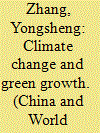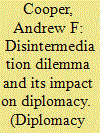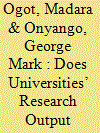|
|
|
Sort Order |
|
|
|
Items / Page
|
|
|
|
|
|
|
| Srl | Item |
| 1 |
ID:
134367


|
|
|
|
|
| Summary/Abstract |
This paper presents a new research agenda on climate change and green growth from the perspective of the division of labor in classical economics. The paper covers three major dimensions of green growth (i.e. carbon emissions, environmental protection and material resources use) and some related important topics, as well as the fresh policy implications of the new research agenda, Typical marginal analysis in a given structure of the division of labor suggests that “green” action is a burden to economic development. Therefore, climate negotiation has become a burden-sharing game and has reached a stalemate. New thinking is badly needed to rescue these negotiations and to drive a shift to a new “green growth” paradigm. The proposed new research agenda represents an effort to create a new narrative on climate change and green growth. Because the new research agenda can theoretically predict the possibility that a more competitive structure of the division of labor could be triggered by “green” policy, it has promising policy implications for various important challenges facing us in the 21st century.
|
|
|
|
|
|
|
|
|
|
|
|
|
|
|
|
| 2 |
ID:
170850


|
|
|
|
|
| Summary/Abstract |
Political leaders describe the climate crisis as the greatest challenge of our time, but it plays only a marginal role in the foreign policy of most states and in the scholarly literature on international relations. Only 0.77 percent of the articles in five top international relations (IR) journals between 2015 and 2019 were about climate change. This is a problem, for when the full impact of climate change and policy responses to climate change is felt, it will redefine international politics. We suggest five broad areas where it is necessary to better understand how climate change will reshape world politics: sovereignty, security, status and reputation, norms and coalitions, and the geopolitics of energy.
|
|
|
|
|
|
|
|
|
|
|
|
|
|
|
|
| 3 |
ID:
170931


|
|
|
|
|
| Summary/Abstract |
This contribution to the Forum argues the research agenda on diplomacy has to be recalibrated: with a greater focus on how diplomacy is challenged domestically. This turbulence is intertwined with the rise of populism not from the periphery as largely featured in the past, but in the countries at the core of the international system, most noticeable in the Brexit campaign in Britain and the Donald Trump Administration in the United States. The challenge posed is that diplomacy – no less than other institutions – traditionally viewed positively as providing continuity and stability in terms of the national interest and identity has increasingly been stigmatized. Although distinctive national features cannot be ignored, a common feature in terms of generic cause and effect is an association with the concept of disintermediation highlighting a separation of diplomats not only from other components of governmental bureaucracy but citizens at large. The effect of disintermediation is more pervasive because of the use of social media and other means of going around established institutions. In addressing th is serious challenge, the research agenda must extend to comprehensive options for organisational maintenance in which the institution and operational machinery of diplomacy is re-directed towards delivery in the service of citizens.
|
|
|
|
|
|
|
|
|
|
|
|
|
|
|
|
| 4 |
ID:
193026


|
|
|
|
|
| Summary/Abstract |
Few studies on developing countries have investigated the alignment of research output to a country’s development agenda and economic productivity. Using evidence from Kenya, this study sought to empirically determine whether the country’s research output is aligned to its development agenda in the first instance and to establish the output’s relationship to economic productivity. Journal publications were used to measure research output. From the analysis, 86% of the publications fell within one or more of the national development priority areas, though 60% were in only 6 of the 35 areas. Several areas had no publications at all during the period under investigation. Furthermore, excluding the health and education sectors, a strong positive relationship was established between the number of publications in different priority areas and those areas’ contribution to Gross Domestic Product. The Government, therefore, needs to avail research funding to research institutions, which, in turn, need to focus their research effort on all identified national development priority areas if Kenya’s development aspirations are to be achieved and the desired economic growth attained.
|
|
|
|
|
|
|
|
|
|
|
|
|
|
|
|
| 5 |
ID:
174096


|
|
|
| 6 |
ID:
142777


|
|
|
|
|
| Summary/Abstract |
This article sets a new agenda for research into the geopolitics of hotels. Moving beyond the study of hotels as neutral sites of leisure and tourism, hospitality mediated by financial exchange, we argue that hotels need to be researched as geopolitical sites. Hotel spaces – from conference rooms to reception halls, from hotel bars to corridors and private rooms – are connected to broader architectures of security and insecurity, war- and peacemaking. We present six themes for this research agenda: hotels as projections of soft power, soft targets for political violence, strategic infrastructures in conflict, hosts for war reporters, providers of emergency hospitality and care, and infrastructures of peace-building. We conclude that the geopolitical potential of hotels emerges from two spatial dimensions of the relation of hospitality: hotels’ selective openness and closure to their surroundings, and their flexible material infrastructures that can facilitate and mediate geopolitical processes. Research on geopolitics, and its engagements with the everyday materialities that shape war and peace, must take seriously the hotel as a geopolitical space.
|
|
|
|
|
|
|
|
|
|
|
|
|
|
|
|
|
|
|
|
|